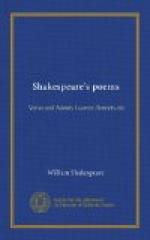|
This section contains 7,973 words (approx. 27 pages at 300 words per page) |

|
SOURCE: Asals, Heather. “Venus and Adonis: The Education of a Goddess.” Studies in English Literature, 1500-1900 13, no. 1 (winter 1973): 31-51.
In the following essay, Asals challenges critics who view Venus as a humorous figure who embodies female lust in its lowest and most aggressive form. Asals argues that when Venus's responses to Adonis are studied in terms of Neoplatonism, Venus's growth as a character and her progression from “Lust” to “Love” become recognizable.
Critical reaction to the figure of Venus in Shakespeare's curious contribution to the body of Elizabethan Ovidian poetry has been almost unanimously unfavorable. As Hallet Smith points out, Venus “represents no ideal picture of physical love. She is dominated by the imagery, which most often and most significantly revolves around the hard and violent appetite of the hawk.”1 Eugene Cantelupe argues that “there is very little divinity and even less of mythology about Venus”—“there is...
|
This section contains 7,973 words (approx. 27 pages at 300 words per page) |

|


